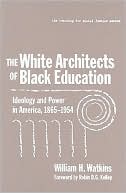

 |

|

The average rating for The White Architects of Black Education: Ideology and Power in America, 1865-1954 based on 2 reviews is 5 stars.
Review # 1 was written on 2015-11-01 00:00:00 Kenneth Tucker Kenneth TuckerThis is a good read for those who are deeply concerned about the imbalance/unequal education of people of color and most assuredly the education of the Black Race.This book could quite possibly be extremely boring, if one isn't interested in the history, ideology and egalitarian lack of equal rights, for people of color in all aspects of society. It deals with the former days of "Slavery to......Modern day Slavery!" |
Review # 2 was written on 2019-11-13 00:00:00 Brigette Mcnew Brigette McnewAn important and thought provoking consideration of how early industrialists and those at the center of early wealth after the Civil War had an impact on the development and engagement of African Americans in education. Examples of those whose impacts are meaningfully acknowledged are Samuel Chapman Armstrong, the Rockefellers, and a group of others, some with well known names and others that have began to slide into obscurity. Perhaps this is what the book does best, it ensures that this intersection of people and industry are acknowledged as being "architects" of education with their fair share of biases, reasoning, and so forth. While there are obviously elements of the biases of white industrialists in such an enterprise, there is also a connection to larger topics that may be better tread in history, such as Booker T. Washington's connection with the Hampton Institute. While topics and studies of that connection may be well known, Watkins in this book fleshes out Armstrong and others as architects who - with admitted bias, racism, and systems of oppression in place - still acted as architects of African American education. While the system was - and in some measure still remains- flawed for underrepresented voices, in closing Watkins touches on something that should be considered in other studies, saying, in part: "In many ways, the forging of this endeavor helped to teach America's corporate industrial class how to rule." If this is true, and Watkins presents enough evidence to make it worth consideration, then how does continuing educational needs and discussions speak to the value, longevity, and purpose of that rule? |
CAN'T FIND WHAT YOU'RE LOOKING FOR? CLICK HERE!!!